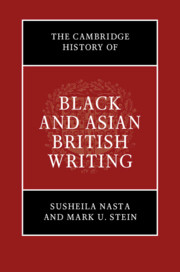Book contents
- The Cambridge History of Black and Asian British Writing
- The Cambridge History of Black and Asian British Writing
- Copyright page
- Dedication
- Contents
- Notes on Contributors
- Preface and Acknowledgements
- Introduction
- Part I New Formations
- Part II Uneven Histories
- (I) Global Locals
- 6 Between the Wars
- 7 Mobile Modernisms
- 8 Establishing Material Platforms in Literary Culture in the 1930s and 1940s
- 9 Transnational Cultural Exchange
- 10 Political Autobiography and Life-Writing
- 11 Staging Early Black and Asian Drama in Britain
- (II) Disappointed Citizens
- (III) Here to Stay
- Part III Writing the Contemporary
- Select Bibliography
- Index
9 - Transnational Cultural Exchange
The BBC as Contact Zone
from (I) - Global Locals
Published online by Cambridge University Press: 19 December 2019
- The Cambridge History of Black and Asian British Writing
- The Cambridge History of Black and Asian British Writing
- Copyright page
- Dedication
- Contents
- Notes on Contributors
- Preface and Acknowledgements
- Introduction
- Part I New Formations
- Part II Uneven Histories
- (I) Global Locals
- 6 Between the Wars
- 7 Mobile Modernisms
- 8 Establishing Material Platforms in Literary Culture in the 1930s and 1940s
- 9 Transnational Cultural Exchange
- 10 Political Autobiography and Life-Writing
- 11 Staging Early Black and Asian Drama in Britain
- (II) Disappointed Citizens
- (III) Here to Stay
- Part III Writing the Contemporary
- Select Bibliography
- Index
Summary
While recent scholarship on radio has begun to reveal the important role played by otherwise discrete areas of the BBC, notably the Indian Section of the wartime Eastern Service (1941-1945), and the West Indian literary magazine programme: ‘Caribbean Voices’ (1944-1958), there has been less exploration of the exchanges and friendships between West Indian, African, and South Asian artists across different programmes. Equally, the pragmatic factors and power relations that often prohibited, or short-circuited, the formation of collaborative cultures at the mid-century BBC remains little understood. Drawing on little-known scripts and BBC archival records relating to a range of now well-known artists and intellectuals (including Andrew Salkey, Una Marson, Mulk Raj Anand, Cedric Dover, Peter Abrahams, David Diop, Henry Swanzy, and George Orwell), this chapter critically examines the overlaps and asymmetrical structures that characterised cross-cultural collaboration at the corporation.
Keywords
- Type
- Chapter
- Information
- The Cambridge History of Black and Asian British Writing , pp. 148 - 162Publisher: Cambridge University PressPrint publication year: 2020
- 1
- Cited by

